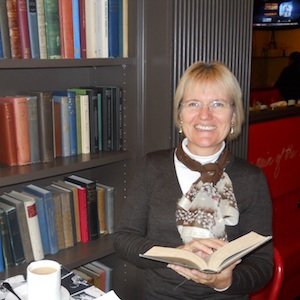The Story Behind “Two Poems” by Ruth Foley
Today’s post is written by Ruth Foley. We published two of her poems in our Spring 2015 issue.
Both “Testament” and “With Love, The Choice” are, at heart, about how little control we have over what we leave.
I’m fascinated with loss—as so many poets are—and I had been thinking quite a bit about how little loss we are able to control. People die, people leave, items break or wear through, and most of the time there’s precious little we can do about it. We mourn or rage or arrange for a replacement as appropriate. The world keeps spinning, and if we’re lucky, it continues to take us with it. Perhaps the best we can hope for is to find some kind of peace with those losses. I wrestle with that peace in my work—peace is slippery and uncooperative—and in both of these poems I’m trying to find some sort of compromise between regret and acceptance. It is an uneasy balance.
“Testament” is an attempt to address the things I can neither give nor lose. It’s a letting go of not just items (shoes, towels) but of the pieces of the world that get those things. If you’ll forgive me conflating myself with the speaker for a moment, I cannot actually leave anything to a set of sailing charts or to a snake, and certainly not to a dead bug. And I am also leaving the charts, the snake, the bug. It’s letting go by means of becoming the lost instead of the one who is losing. It’s also an attempt to express the futility of trying to manage it all—perhaps the trash collector will get my shoes when I die, but someone will get them, but I really don’t have any control over it, and I like to think I’ll be well past caring. In that sense, the poem is just as much about the reader, who is tasked with distributing this mad list of undeliverable items, as it is about the speaker. We acquire the detritus of our dead, and we often have no idea what to do with it. Our sudden ownership of these things is one of the indications that we’ve suffered a loss—it’s loss and acquisition simultaneously.
“With Love, The Choice” is an attempt to cede a bit of control. The desire for control is a human one, surely, and the poets I know want desperately to control—if nothing else—the poem, but I don’t know that we can actually control anything. At the very least, exerting control in one area is bound to unleash a swarm of ramifications, and new things, things we can’t necessarily predict, will arise. Our odds of controlling all of those new things are not good, not good at all. There are limits to what we can embrace, and choosing to let other things slip by can be a blessing or a nightmare, depending on how we take those changes. But those choices—the ones we do not make—come with their own sets of losses, ones we often can’t even be aware of. It will all be the same to us, though, because we won’t—we can’t—know the difference. We only get to experience the results of our choices.
About Ruth Foley
Ruth Foley lives in Massachusetts, where she teaches English for Wheaton College. Her work appears in numerous web and print journals, including Antiphon, The Bellingham Review, The Louisville Review, and Nonbinary Review. Her chapbook Dear Turquoise is available from Dancing Girl Press. She serves as Managing Editor for Cider Press Review.
Photo credit—Jed Foley







